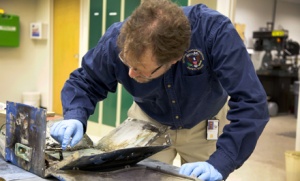National Transportation Safety Board: Dreamliner incidents ‘unprecedented’
 NTSB materials engineer Matt Fox examines the casing from the battery involved in the JAL Boeing 787 fire incident in Boston
NTSB materials engineer Matt Fox examines the casing from the battery involved in the JAL Boeing 787 fire incident in Boston Officials at the National Transportation Safety Board in the United States have said nothing will be ruled out as they continue to investigate the cause of a series of problems with the Boeing 787 Dreamliner.
Giving an update to reporters yesterday, NTSB chair Deborah Hersman branded the series of events “unprecedented” and painted a picture of a disaster averted when a battery caught fire in a recently landed Dreamliner at Boston airport earlier this month.
Hersman displayed the charred remnants of a battery which had “spewed molten electrolytes” as the plane taxied at the airport.
“This is an unprecedented event,” said Hersman.
“We do not expect to see fire events on board aircrafts. This is a very serious safety concern.”
The Boston incident, on January 7th, was followed be reports of smoke aboard a plane flying over Japan on January 16th, prompting the Federal Aviation Administration to ground all United States-based Dreamliners and launch an investigation.
Japan Airline and All Nippon Airways had already grounded their planes, with all other nations following suit.
Hersman told journalists the NTSB had determined the lithium ion battery on the Boston aircraft experienced a “thermal runaway” and a “short circuit”.
In a thermal runaway, a battery releases energy in the form of heat, increasing the temperature of the battery and causing further damage.
In an electrical short, electricity follows an unintended path.
However, safety investigators have not determined which event occurred first, or whether they were the cause or the effect of the incident.
Neither event should have occurred on the Dreamliner, Hersman said.
“These events should not happen as far as design of the aircraft.
“There are multiple systems to protect against a battery event like this.
“Those systems did not work as intended, we need to understand why,” she said.
In a statement, Boeing continued to reassure passengers it was doing everything possible to ensure safety.
A statement read: “Boeing welcomes the progress being made in the 787 investigation discussed today by the US National Transportation Safety Board in Washington DC.
“The regulatory and investigative agencies in the US and Japan have dedicated substantial resources to these investigations, and we appreciate their effort and leadership.
Boeing continues to assist the NTSB and the other government agencies in the US and Japan responsible for investigating two recent 787 incidents.
“The company has formed teams consisting of hundreds of engineering and technical experts who are working around the clock with the sole focus of resolving the issue and returning the 787 fleet to flight status.
“We are working this issue tirelessly in cooperation with our customers and the appropriate regulatory and investigative authorities.
“The safety of passengers and crew members who fly aboard Boeing airplanes is our highest priority.”

